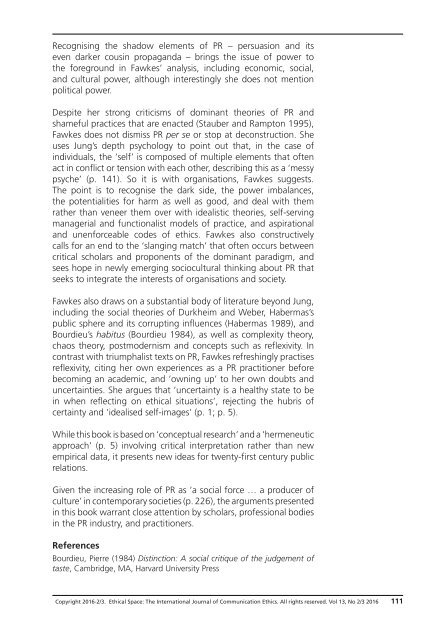Beyond clickbait and commerce
v13n2-3
v13n2-3
Create successful ePaper yourself
Turn your PDF publications into a flip-book with our unique Google optimized e-Paper software.
Recognising the shadow elements of PR – persuasion <strong>and</strong> its<br />
even darker cousin propag<strong>and</strong>a – brings the issue of power to<br />
the foreground in Fawkes’ analysis, including economic, social,<br />
<strong>and</strong> cultural power, although interestingly she does not mention<br />
political power.<br />
Despite her strong criticisms of dominant theories of PR <strong>and</strong><br />
shameful practices that are enacted (Stauber <strong>and</strong> Rampton 1995),<br />
Fawkes does not dismiss PR per se or stop at deconstruction. She<br />
uses Jung’s depth psychology to point out that, in the case of<br />
individuals, the ‘self’ is composed of multiple elements that often<br />
act in conflict or tension with each other, describing this as a ‘messy<br />
psyche’ (p. 141). So it is with organisations, Fawkes suggests.<br />
The point is to recognise the dark side, the power imbalances,<br />
the potentialities for harm as well as good, <strong>and</strong> deal with them<br />
rather than veneer them over with idealistic theories, self-serving<br />
managerial <strong>and</strong> functionalist models of practice, <strong>and</strong> aspirational<br />
<strong>and</strong> unenforceable codes of ethics. Fawkes also constructively<br />
calls for an end to the ‘slanging match’ that often occurs between<br />
critical scholars <strong>and</strong> proponents of the dominant paradigm, <strong>and</strong><br />
sees hope in newly emerging sociocultural thinking about PR that<br />
seeks to integrate the interests of organisations <strong>and</strong> society.<br />
Fawkes also draws on a substantial body of literature beyond Jung,<br />
including the social theories of Durkheim <strong>and</strong> Weber, Habermas’s<br />
public sphere <strong>and</strong> its corrupting influences (Habermas 1989), <strong>and</strong><br />
Bourdieu’s habitus (Bourdieu 1984), as well as complexity theory,<br />
chaos theory, postmodernism <strong>and</strong> concepts such as reflexivity. In<br />
contrast with triumphalist texts on PR, Fawkes refreshingly practises<br />
reflexivity, citing her own experiences as a PR practitioner before<br />
becoming an academic, <strong>and</strong> ‘owning up’ to her own doubts <strong>and</strong><br />
uncertainties. She argues that ‘uncertainty is a healthy state to be<br />
in when reflecting on ethical situations’, rejecting the hubris of<br />
certainty <strong>and</strong> ‘idealised self-images’ (p. 1; p. 5).<br />
While this book is based on ‘conceptual research’ <strong>and</strong> a ‘hermeneutic<br />
approach’ (p. 5) involving critical interpretation rather than new<br />
empirical data, it presents new ideas for twenty-first century public<br />
relations.<br />
Given the increasing role of PR as ‘a social force … a producer of<br />
culture’ in contemporary societies (p. 226), the arguments presented<br />
in this book warrant close attention by scholars, professional bodies<br />
in the PR industry, <strong>and</strong> practitioners.<br />
References<br />
Bourdieu, Pierre (1984) Distinction: A social critique of the judgement of<br />
taste, Cambridge, MA, Harvard University Press<br />
Copyright 2016-2/3. Ethical Space: The International Journal of Communication Ethics. All rights reserved. Vol 13, No 2/3 2016 111


